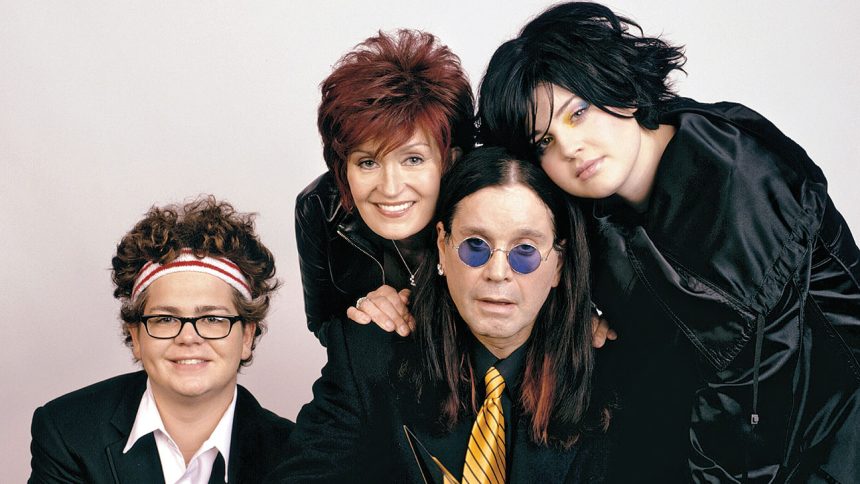Critic’s Notebook: Ozzy Osbourne Created the Template for Reality TV Celebrity Reinvention, From Flavor Flav to Donald Trump
Back in 2022, Fox’s The Masked Singer revealed that the Jack in the Box was actually former New York City Mayor Rudy Giuliani — a figure once known, however speciously, for unifying his city in the aftermath of the 9/11 terror attacks, but more recently for a string of high-profile humiliations linked to his role in attempting to overturn the results of the 2020 presidential election.
At the time, I wrote about reality TV’s history of image laundering, particularly when it came to disgraced and semi-disgraced conservative politicos, from Omarosa Manigault Newman to Anthony Scaramucci (Celebrity Big Brother), Sean Spicer (Dancing With the Stars) to Sarah Palin (The Masked Singer) and more.
Image laundering isn’t necessarily the thing reality TV does most frequently; its primary appeal still stems from its ability to turn ordinary people into quick-burning stars, stretching back to landmarks like Candid Camera or The Gong Show. But it’s a venerable subgenre, based on the principle that unscripted programming can reveal truth that supersedes preexisting evidence: “What you thought you saw, what you thought you understood, wasn’t real. THIS is real. You can tell because ‘reality’ is part of the programming listing.”
The ultimate canary in the coal mine of what became the dominant programming wave of the ’00s was, of course, Ozzy Osbourne, who died on Tuesday, July 22, at 76.
You Might Also Like
Prior to the March 5, 2002, launch of MTV’s The Osbournes, Ozzy Osbourne would have been considered more likely to bite the head off of that canary.
If you grew up in the ’70s or ’80s, Osbourne was a figure whose dark aura bordered on mythological. Nicknamed the Prince of Darkness, the Black Sabbath frontman projected savage intensity with an occult edge. The music felt almost secondary to apocryphal stories tangential to the music.
Black Sabbath was so dark, so unholy, that the band’s songs inspired murders and self-harm. You didn’t need to know a single Black Sabbath song to be able to reference Osbourne’s drug- and alcohol-fueled antics, which included fights, various arrests and, yes, a tendency to bite the heads off various winged creatures, from doves to bats.
Ozzy Osbourne was a BAD man, cultivating and curating that badness — at least if you believe that Osbourne was, at the time, capable of image curation. More than anything, he seemed to be out of control, which conveniently was a theme of more than a few Black Sabbath songs.
The Osbournes, which utilized a jazzy cover of Osbourne’s solo smash “Crazy Train” as its theme song, took Ozzy Osbourne’s image, well-earned across multiple generations of fans, and flipped it on its head.
What if, the show posited, one of the fiercest rockers to ever evoke Aleister Crowley and all things Satanic was just a fuddy-duddy father, a mumbling 50-something with an epic past but a present dominated by a loving-yet-controlling wife (Sharon) and two kids (Kelly and Jack, since daughter Aimee refused to appear) who had no interest in kowtowing to their easily distracted dad just because he was once globally notorious.
The Ozzy Osbourne of The Osbournes wasn’t entirely neutered, but he was a near-parody shell of the man who was once banned from the Alamo for urination. He was constantly swearing and frequently stoned, but much of the show, at least initially, was governed by the principle that nearly every aspect of ordinary family life instantly becomes funnier when the family in question is fronted by the Prince of Darkness. It was The Addams Family writ real.
Your father can’t figure out the remote control for a new TV? Funny. Your father is Ozzy Osbourne? Hilarious. Your dog needs therapy? Funny. Ozzy Osbourne’s dog needs therapy? Hilarious. A father-son fishing trip runs amok? Funny. Ozzy Osbourne is the father and the former dove-biter’s biggest catch is a bird? Hilarious.
Maybe if you were deeply invested in the authenticity of Black Sabbath and that incarnation of Ozzy, The Osbournes was a betrayal, turning mayhem into minstrelsy. But in acknowledging the artificiality and performativity of Ozzy’s terrifying persona, The Osbournes seemed to be protesting “This is real” — even as what we watched on TV came across as equally contrived.
Sure, this doddering middle-aged version of Ozzy Osbourne was every bit as much a persona as the earlier guy. But enough in The Osbournes cut through the contrivances of a genre that was still finding its voice that it built a synthetic credibility. Maybe some scenes and interactions were right on the edge of scripted, and maybe Ozzy’s primal form was that of a hammy lover of the spotlight. But if Sharon’s cancer was real and Ozzy’s ATV accident was real, maybe it all was real.
The Osbournes ushered in what was already either a fourth or fifth act of Osbourne’s career and life. It became acceptable to view him as lovable, family-friendly, an elder statesman in a musical classification that had similarly gentrified. He and his entire family became habitués of reality television. The co-writer of “War Pigs” did a duet with Miss Piggy.
With The Osbournes as its most persuasive proof-of-concept, reality TV became dominated by this sort of celebrity normalizing, this sort of celebrity rehab. Without The Osbournes, we don’t get Jessica Simpson and Nick Lachey parlaying their respective ditzy blond and amiable himbo stereotypes into semi-scripted comedy in Newlyweds. Without The Osbournes, the term “surreal” would still evoke Magritte and Breton and Dalí, rather than the romance between Flavor Flav and Brigitte Nielsen. Without The Osbournes, I’m not sure who Timothée Chalamet would be dating, whether David Schwimmer repeatedly saying “Juice” in American Crime Story would still be funny, or why anybody would have voted for Caitlyn Jenner to be governor of California. Giuliani probably would never have gotten to be the Jack in the Box.
It could be argued, probably correctly, that without Ozzy Osbourne and his extreme MTV-sponsored makeover, Donald Trump never would have had the opportunity to cosplay as a still-relevant, still-successful businessman on The Apprentice.
Was Donald Trump circa 2003 more relevant than Ozzy Osbourne circa 2000? Probably, but the stuffed-crust pitchman, frequent Howard Stern guest and second-rate “as himself” film and television guest star was probably equally far from the presidency. If The Osbournes served as an eraser or recontextualizer for all of Ozzy Osbourne’s ’70s and ’80s misadventures, forcing us to reevaluate the man we thought Ozzy was, The Apprentice was a time machine, restoring the luster of The Art of the Deal and convincing many Americans that the authority conveyed by Mark Burnett’s editing actually reflected the man Donald Trump still was.
There may be some big ripples there.
The Osbournes changed the way we saw Ozzy Osbourne, changed the way we saw reality television and, apparently, it’s still changing the way we see reality.







